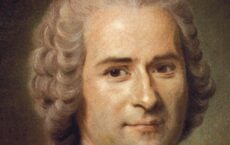
It’s not often that people nowadays invoke an ancient Greek philosophical concept but – without knowing that this is what they’re doing – this is precisely what happens, in certain parts of Britain, when people criticise someone else’s lack of common sense. In Yorkshire, in particular, you’ll still often hear someone voice this kind of […]
Read MoreThe eighteenth-century German philosopher Immanuel Kant (1724–1804) became a towering figure in the history of Western philosophy because his thinking was revolutionary in many ways. Take one of his famous doctrines as an example: with what he called ‘transcendental idealism’ Kant believed he was radically reconceiving the nature of knowledge and reality in a way […]
Read MoreWhat if the Bible that sits on your shelf-the Bible you hear read from in services, the Bible from which your clergy preach sermons, the Bible held up by politicians inspired by its contents-was a lie? What if some long-lost-or long-suppressed!-text suddenly came to light, dating to the first century, overturning everything you, your clergy, and your politicians thought […]
Read More2024 promises to be a year of decision for democracies worldwide, with important elections scheduled in Taiwan, Venezuela, Mexico, Russia, the United Kingdom, and the United States. Several of these elections are taking place in countries with relatively fragile democracies, and where the voters themselves are uncertain about the political health and stability of their […]
Read MoreStudying self-referring language is fun. This is the reason why so many philosophers talk about the logic of truth. When we talk about the truth or falsity of sentences, we use language to talk about itself. My book, The Logic of Entailment and its History (Cambridge University Press, 2024), is not about truth, but about […]
Read MoreThomas Kuhn published The Structure of Scientific Revolutions in 1962, over 60 years ago. The book is principally remembered for the role it attributes to paradigm change in the development of science. On Kuhn’s account, the growth of scientific knowledge follows a pattern; periods of normal science, characterized by widespread consensus, are interrupted by paradigm […]
Read MoreThe main claim of Kant’s Critique of Pure Reason and the Method of Metaphysics (Cambridge University Press 2023) is that the Critique of Pure Reason should be read as the doctrine of method of metaphysics. One way to clarify the meaning of this claim is to say that it proposes a new perspective on Kant’s […]
Read MoreSt Andrew’s Anglican church, Tangier Can religions change? Historically, the evidence is overwhelming that they do. But for believers standing against this has long been the notion of revelation as the eternal, unchanging word of God. Even as late as 1893 Pope Leo XIII described the entirety of the Christian scriptures as ‘dictated by the […]
Read MoreIt’s not often that people nowadays invoke an ancient Greek philosophical concept but – without knowing that this is what they’re doing – this is precisely what happens, in certain parts of Britain, when people criticise someone else’s lack of common sense. In Yorkshire, in particular, you’ll still often hear someone voice this kind of […]
Read MoreThe eighteenth-century German philosopher Immanuel Kant (1724–1804) became a towering figure in the history of Western philosophy because his thinking was revolutionary in many ways. Take one of his famous doctrines as an example: with what he called ‘transcendental idealism’ Kant believed he was radically reconceiving the nature of knowledge and reality in a way […]
Read MoreWhat if the Bible that sits on your shelf-the Bible you hear read from in services, the Bible from which your clergy preach sermons, the Bible held up by politicians inspired by its contents-was a lie? What if some long-lost-or long-suppressed!-text suddenly came to light, dating to the first century, overturning everything you, your clergy, and your politicians thought […]
Read More2024 promises to be a year of decision for democracies worldwide, with important elections scheduled in Taiwan, Venezuela, Mexico, Russia, the United Kingdom, and the United States. Several of these elections are taking place in countries with relatively fragile democracies, and where the voters themselves are uncertain about the political health and stability of their […]
Read MoreStudying self-referring language is fun. This is the reason why so many philosophers talk about the logic of truth. When we talk about the truth or falsity of sentences, we use language to talk about itself. My book, The Logic of Entailment and its History (Cambridge University Press, 2024), is not about truth, but about […]
Read MoreThomas Kuhn published The Structure of Scientific Revolutions in 1962, over 60 years ago. The book is principally remembered for the role it attributes to paradigm change in the development of science. On Kuhn’s account, the growth of scientific knowledge follows a pattern; periods of normal science, characterized by widespread consensus, are interrupted by paradigm […]
Read MoreThe main claim of Kant’s Critique of Pure Reason and the Method of Metaphysics (Cambridge University Press 2023) is that the Critique of Pure Reason should be read as the doctrine of method of metaphysics. One way to clarify the meaning of this claim is to say that it proposes a new perspective on Kant’s […]
Read MoreSt Andrew’s Anglican church, Tangier Can religions change? Historically, the evidence is overwhelming that they do. But for believers standing against this has long been the notion of revelation as the eternal, unchanging word of God. Even as late as 1893 Pope Leo XIII described the entirety of the Christian scriptures as ‘dictated by the […]
Read MoreKeep up with the latest from Cambridge University Press on our social media accounts.
Jesse Spafford is a Lecturer at the Victoria University of Wellington. His work explores debates between libertarians, socialists, and anarchists over the moral status of the market and the state, and he is the author of a number of articles in journals including Philosophical Studies, Synthese, and the Journal of Ethics and Social Philosophy.
Mariusz Tabaczek, O.P., is a friar preacher, professor of theology, and member of the Thomistic Institute at the Pontifical University of Saint Thomas Aquinas in Rome. He is the author of Emergence: Towards A New Metaphysics and Philosophy of Science (2019), and Divine Action and Emergence: An Alternative to Panentheism (2021).
Edwin Mares is Professor of Philosophy at Victoria University of Wellington. His publications include Relevant Logic: A Philosophical Interpretation (Cambridge, 2004).
David Merritt author of A Philosophical Approach to MOND
Simon Friederich, author of Multiverse Theories: A Philosophical PerspectiveRijksuniversiteit Groningen, The Netherlands
African American Religions, 1500–2000
Roy W. Perrett, University of Melbourne
Helen Wilcox, Professor of English at Bangor University
Magna Carta, Religion and the Rule of Law
Free Trade and Faithful Globalization
Author of The Late Sigmund Freud
Damon Mayrl is Assistant Professor of Sociology at Universidad Carlos III de Madrid.
https://www.cambridgeblog.org/wp-content/uploads/2017/03/Lorna-Finlayson-photograph.jpg
The Philosophy of Human Evolution
Descartes on Forms and Mechanisms
Forgiveness: a Philosophical Exploration
Evolution, Creationism, and the Battle to Control America\'s Classrooms
Plato and the Talmud
Evolution, Creationism, and the Battle to Control America\\\\\\\'s Classrooms
Constitutional Illusions and Anchoring Truths
Doubt and Skepticism in Antiquity and the Renaissance
I Was Wrong
The Romantic Economist
The Horse in Human History
The Cambridge Companion to Bob Dylan
On Space and Time
The Philosophy of Hebrew Scripture
On Space and Time
A Dictionary of Bible Plants
Yinyang
Peter Singer and Christian Ethics
Spinoza on Human Freedom
Against Autonomy
Senior Inbound Marketing Executive
The First French Reformation
Text and Authority in the South African Nazaretha Church
Muslims of Medieval Latin Christendom, c.1050–1614
A Reference Grammar of French
Cambridge University Press Archivist
An Ancient Commentary on the Book of Revelation
Natural Human Rights: A Theory
Ibn Gabirol\'s Theology of Desire
God, Sexuality, and the Self
Schopenhauer and the Aesthetic Standpoint
Interpreting Avicenna: Critical Essays
The Cambridge Companion to Life and Death
Hegel\'s Phenomenology of Spirit
Aquinas on Human Self-Knowledge
The Mystery of the Last Supper
To receive updates on Philosophy & Religion news from Cambridge University Press and Fifteen Eighty Four, please join our email list below. We will not disclose your email address to any third party








